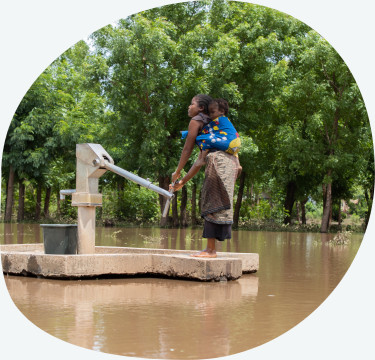MINIMAX Competition winners
MINIMAX Competition Winners!
Have a look through the stories of the MINIMAX Competition winners. These are practical water and climate solutions that MINIMISE the negative impacts of hydroclimatic extremes and MAXIMISE social, economic, and environmental benefits.
The official announcement is available on the GWP website.
After rigorously evaluating the solutions submitted under each of the four themes, we present the winners of the competition that was launched at the World Water Forum in Dakar.
Our expert panel has selected four relevant initiatives and projects that contribute to improving flood and/or drought management considering the following criteria: (1) relevance to the key priority themes, (2) contribution to climate adaptation and mitigation, (3) potential for scalability, (4) multi-stakeholder participation and inclusion.
The four winners will be presenting their MINIMAX solution during the Stockholm World Water Week in August 2022. The Prize includes travel, accommodation, and the registration fee to the World Water Week in Stockholm. The other semi-finalist MINIMAX solutions will be featured on the GWP ToolBox - IWRM Action Hub.

Malawi: BASEflow’s Cyclone Idai Flood Response using mWater
Theme: Developing climate smart water, sanitation, and hygiene (WASH)
In March 2019, Cyclone Idai wreaked havoc in southern Malawi, destroying livelihoods and innocent lives. Leveraging an existing database of 120,000 water points, previously mapped in mWater, the social enterprise BASEflow managed to effectively coordinate the rehabilitation and repair of 364 boreholes within the flood zones and supported the WASH cluster’s emergency response. Using the capabilities of mWater, a versatile data management platform, BASEflow facilitated the coordination of both response efforts, including tracking rehabilitation progress and verifying internally displaced populations in flood victim camps; thereby contributing to a better coordinated disaster response.
Read the full case study
Indonesia: Raising Awareness about Inclusive Early Warning in Papua
Theme: Empowering and engaging youth meaningfully
AWAKE Project is a solution to work inclusively. This project focuses on children by holding education and training in disaster mitigation with more engaging activities based on several learning styles through comics, songs, storytelling, and role-plays, and people with disabilities by equipping them with basic knowledge of preparedness by providing a handbook in Braille and informative videos using sign language. This project was implemented through a multi-governance partnership.
Read the full case study

Italy: MOVIDA - models and tools for integrated damage assessment
Theme: Enhancing water and climate finance
Effective flood risk mitigation requires assessing costs and benefits of alternatives of intervention. In line, the European Floods Directive requires to produce risk maps, as a basis of Flood Risk Management Plans. Damage evaluation is a critical step of this process, due to the lack of consolidated practice in the literature and the technical domains. By allowing scientists and practitioners working together, MOVIDA developed a procedure, and supporting IT tools, embracing state of art knowledge on damage modelling, for the appraisal of flood damage in the Po River District. The procedure was applied in areas at significant risk within the district to prioritize mitigation strategies.
Read the full case study

Transboundary: Drought Risk in the Danube Region - DriDanube project
Theme: Leveraging water data and information
The DriDanube project aimed to increase the society’s resilience to the occurrence of drought in the Danube region by developing a regional drought monitoring tool Drought Watch for better drought characterization and early warning over the region and a strategic document for improved proactive response to drought. Drought Watch includes a specter of drought indices, also based on satellite data, and additionally the results (maps) of cross-border unified drought impact and risk assessment. To improve re-active drought response at the decision-making level, a Danube Drought Strategy with an optimal drought management model was prepared for collaborative and proactive drought management.